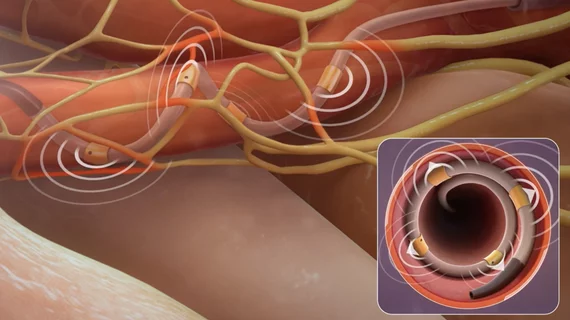The combination of renal denervation and antihypertensive medications is associated with significant blood pressure reductions through three years, according to new research presented at American College of Cardiology (ACC) 2022 meeting, and simultaneously published in The Lancet.[1]
The data in question came from the first 80 patients enrolled in the SPYRAL HTN-ON MED trial. Patients were recruited from all over the globe, including the United States, Germany, Japan, the United Kingdom, Australia, Austria and Greece.
All 80 patients were prescribed antihypertensives for at least six weeks. While 38 patients were treated with Medtronic’s Symplicity Spyral Renal Denervation (RDN) System, the other 42 patients underwent a sham procedure. Medtronic funded the study.
After three years, researcher reported, RDN patients saw an average reduction in 24-hour ambulatory systolic blood pressure of 18.7 mmHg. Patients in the study’s control arm, meanwhile, saw an average reduction of 8.6 mmHg.
Also, looking at office systolic blood pressure, RDN patients saw an average reduction of 20.9 mmHg. The control group saw an average reduction of 12.5 mmHg.
“For the first time, we now have randomized data that demonstrate that in a typical patient population — hypertension patients who are on anti-hypertensive medications and treated with RDN — we are seeing the continued, long-term blood pressure lowering effect,” lead author Felix Mahfoud, MD, a cardiologist at Saarland University Hospital in Homburg, Germany, said in a statement. “Lowering blood pressure can have meaningful clinical results for patients, including a decrease in the risk of cardiovascular events.”
The full SPYRAL HTN-ON MED trial is expected to include up 340 patients. Medtronic hopes to share data on these additional patients by the end of 2022.
The Symplicity Spyral RDN system is still only approved for investigational use in the United States, Japan and Canada, though it is approved commercially in many other parts of the world. According to Medtronic, more than 20,000 RDN procedures have already been performed using this system.
Links to all the ACC 2022 late-breaking clinical trials
Key Interventional Cardiology Takeaways at ACC 2022
Related Renal Denervation Hypertension Reduction Content:
Patients amenable to interventional procedure for lowering blood pressure
Renal denervation sustains BP reduction for 6 months in sham-controlled trial
Meta-analysis highlights BP-lowering effect of renal denervation
Renal denervation linked to significant drops in blood pressure
Medtronic Announces Renal Denervation Pivotal Trial for the Treatment of Hypertension
TCT.18: Ultrasound-based renal denervation tops radiofrequency ablation for BP lowering
Renal denervation can reduce BP, severity of sleep apnea
Reference:

